TrekCore talks to Robert Meyer Burnett, one-half of the talented duo responsible for the creation of the new bonus features on Star Trek: The Next Generation‘s remastered Blu-Ray releases. Normally to be found beavering away in his edit bay, Rob generously took several hours out of his busy schedule to talk to me about all things Star Trek, answering questions about his work and dropping several juicy hints about the exciting things he and Roger Lay Jr. have planned for future Star Trek Blu-Ray releases.
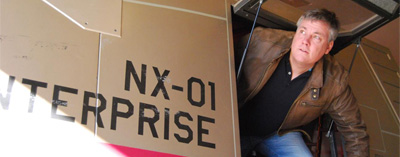
Robert Meyer Burnett: Who Interviews the Interviewer? Part 3
Interviewed by Adam Walker for TrekCore.com
![]()
TrekCore: In the second season of The Next Generation, you guys have really raised the bar to crazy heights with the quality of the features. Let’s break them down a bit – what approach for the “Making it So” documentary did you take? Was there anything you wanted to differently, in hindsight, from Season One?
Robert Meyer Burnett: Well, I wanted to let people talk a little bit more. You’ll notice that a lot of time with these documentaries, you intercut people reiterating the points. I wanted to slow it down a bit. Rob Bowman was one of the key directors on The Next Generation in the first two years – he directed “Where No One Has Gone Before”, “Datalore”, “Elementary, Dear Data”, “Q Who” – he really brought a visual flair to the show. We weren’t able to get him for the first season because he’s an executive producer and director on Castle and he’s really busy, but he’s such a great interview that I just wanted to let him talk. I wanted to let him, and Melinda [Snodgrass], and John de Lancie just talk! I wanted to just slow it down and let these people talk a little longer.
And then, of course, having Gates McFadden tell the story about how she left – I wanted to see how much I could get away with; how much candor. Having Diana Muldaur talk as well; there was more of the idea that we’re answering… the inception of the show had been covered, but the other things, about how people felt about various things that went on – did Diana Muldaur feel she was replacing Gates McFadden? I wanted her to say if she felt that way, and she says in the documentary, “No.” So, for the second season, I really wanted to get people’s feelings out there instead of just conveying information.
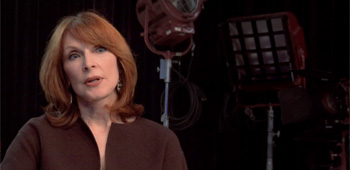
Gates McFadden’s leaving story has long since been speculated over by fans. Robert Meyer Burnett felt it was an important part of the show’s history to be included in the documentary.
TrekCore: We should talk a bit about Diana Muldaur, because she was one of the biggest challenges for you guys in the second season. These documentaries are notable for featuring a lot of interviews with people we rarely hear from, but Diana Muldaur was a real coup – I know that you were questioned on Twitter almost daily whether or not she would be coming on for Season Two. Tell us about some of the challenges you faced getting her.
Robert Meyer Burnett: First of all, she lives on Martha’s Vineyard on the East Coast – that’s her permanent residence. We’re going through her agent, and her manager, and they always want to make sure they’re protecting their clients, so you can’t blame them – but they always want to know “Is there money involved? Are my clients going to get any money; am I going to get any money?” They’re very protective, but we don’t have a lot of money. We don’t have any money to give people, really! At least, Roger and I don’t have any money – we’re just trying to get people to do it because we really wanted them to. I think what ultimately ended up happening is that we went to Diana directly, after we weren’t getting anywhere and CBS wasn’t getting anywhere with her management.
After the [2012 Creation Star Trek Convention in Las Vegas], Roger contacted Diana directly and opened a dialogue at the behest of CBS, because they couldn’t get her. It went on and on – she wasn’t in the best of health – but we relentlessly pursued her, and I think because Roger’s got this great half-Puerto Rican, half-Cuban accent, he used the dulcet tones of his voice and seduced Diana into doing it! (Laughs) It worked out well. I think that once she knew how much… we really, really wanted Diana, and we couldn’t do the second season without her. She really hasn’t spoken a lot about Star Trek – I know she’s been to a few conventions and she’s gone on a Trek cruise – once she knew… like, when she came down and I interviewed her, we took good care of her. We sent a car to pick her up… I mean, she just got out of the hospital, and in literally just a couple of days, she agreed to do the interview. It was great.
We were all set to interview Whoopi Goldberg –
TrekCore: I was about to mention that. We mentioned in our review that you weren’t able to get Whoopi in time for this set; when you have a deadline to meet, how flexible is CBS when it comes to accommodating these last-minute interviews?
RMB: Oh my god, CBS has held things until the last minute. CBS has been ready to throw us out the door. But that’s when big daddy Ken Ross steps in and says “No.” We have had more support from them… like, when they want to master the discs, they’re like, “Where the hell’s the VAM?”Ken Ross, man… he’ll say, “If you guys think it’s important…” He will hold up the discs. This kind of support is just incredible.
Now, we knew we couldn’t get Whoopi for Season Two, because it was the summer and she was on vacation, but we had set up an interview for Season Three. We figured, that’s fine, because John de Lancie wasn’t on Season One – we knew we couldn’t get him then, but we were going to get him later. The great thing is that we have seven seasons, so as long as we can get new people every season… but we had scheduled our Whoopi Goldberg interview for late October, and I was flying back from London, and then Hurricane Sandy hit. I got stuck in Heathrow in London, Roger got stuck in LA, and now we’re trying to get back with Whoopi’s people and go interview her. She’s completely down for it. That’s the best part – we’ve got seven seasons to get Whoopi, and just like we only got John de Lancie for Season Two, but I thought that was a great interview. Just let him talk and tell his story.
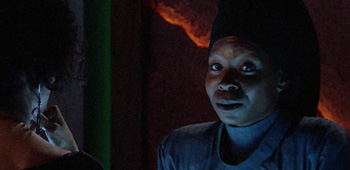
Scheduling interviews can sometimes be fraught with problems. Robert’s interview with Whoopi Goldberg was postponed due to travel problems but he aims to schedule her for inclusion in a future season.
TrekCore: Your choice of clips and music cues used to accompany the documentaries have kind of molded them into a unique style which have really gone down well with the fans. You’re clearly a massive Ron Jones fan, using music from his boxed set; how do you decide on the edits to make, and which clips and music tracks to use?
Robert Meyer Burnett: I really appreciate you saying that, because I really spend a lot of time…I try and choose clips and music that best illustrate the points that are being made by the interview subjects, but the connections that I’m drawing are very fan-oriented. People that really know the show will totally understand what I’m trying to do. The layman may not. It’s like what you said about the end of the first part of the Season Two documentary, using that Klingon Tea Ceremony music which I think is one of the most moving pieces of music written for The Next Generation.
TrekCore: Oh, without a doubt.
Robert Meyer Burnett: What I’m given is “approved music”. CBS has a blanket clearance to use music – so far it’s only been Ron Jones’ music, which is great because I just love his music, not that Dennis McCarthy and Jay Chattaway didn’t do great work – so I get to use every cue that Jones has ever written for the show. So I try to find the best music that underscores – again, I approach it like a feature film – I try to use music that is emotional, that will reiterate the points that are being made by the interview subjects. And the clips that I pick – it’s the same as when I worked on the Star Trek Experience, I knew which clips to pick – but if you look at the end of the documentary when Diana Muldaur and Rick Berman are talking, I decided, “You know what I’m going to do? I’m going to cut a montage and use a shot from every single episode of Season Two.”
Now, I don’t know if people noticed – I thought it was pretty apparent – but when I’m doing that, I’m like, which shot best exemplifies the episode? If you get one shot where a fan could know… what happens is, if you put that many iconic shots up against each other, it creates an emotional response in the viewer.
TrekCore: I don’t think it was just the combination of shots, but I think it was almost a ‘perfect storm’ – you’ve got the Klingon Tea Ceremony music…
Robert Meyer Burnett: It’s what’s being said, it’s the music, and it’s the imagery. All those things together, working in tandem. It’s funny, though – there’s one shot where I think I missed the boat, I used Mick Fleetwood’s character, where he plays that crazy fish creature [in “Manhunt”] – I used that shot in the montage. It’s a humorous. You laugh at it. But I was trying to create this really emotional montage, and Roger said, “That ruins your tone!” I fought him on it, and I left it in, stupidly – but he was right. In the Fathom version [for the Season Two theatrical event], I swapped out that shot for the shot of Lwaxana Troi and Picard having dinner together and they toast each other. It’s a much more moving shot, and it much better exemplifies the episode. I was wrong with that shot, but every other shot… I love the shot when the light comes out of Deanna’s hands at the end of “The Child” – that sets it off – you see Data from “Pen Pals” taking [Sarjenka]’s body and laying it down on the bed…
Picking a shot from “The Icarus Factor” was interesting. Do you use Kyle Riker? To me – while that was good – what was so awesome about that episode was the crew doing [the Age of Ascension ceremony] for Worf. He walks in and sees the Klingon warriors and he realizes what’s going on; that, to me, was the emotional center of that episode. That was the killer image. The only humorous part of the montage should’ve been Brian Thompson [as Klag] and Riker laughing on the Klingon ship. That was the moment in [“A Matter of Honor”] that was so great, watching those two cultures come together, meeting on common ground. It’s whatever I think is important about those episodes, that’s what I use.
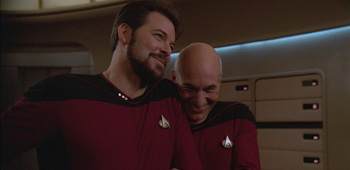
The blooper reel cut for Season 2 was an amazing discovery for Burnett. He edited down a total of SIX HOURS of outtakes to the 10 minute reel presented.
TrekCore: The brand new blooper reel on Season Two is such a fantastic addition to the set. How was that material initially presented to you? How did you go about editing it down to just ten minutes?
Robert Meyer Burnett: Blooper reels are traditionally all done the same way – you know, the humor is augmented. A lot of the time, it’s just pratfalls. Here’s the thing: when the editors had originally cut the show, they put aside footage that could be used in blooper reels, because it was asked for, originally – but it was never used. So when we went back into these boxes of negatives, there were these outtakes and things that were put aside. Again, god love CBS Home Entertainment, this is not something they had to do, but Dave and Ryan felt it was important – they transferred this footage, into HD, which is amazing; I got six hours of outtakes. Now, most of that, truth be told, is just blown takes. But what I wanted, what was important to me… the outtakes had to convey part of the actors. You had to get a sense of who they were, their sense of humor; you had to know something about them.
There’s a bit when Jonathan Frakes cannot say this technobabble [‘marker beacons’, from “Unnatural Selection”], and I used every cut of it – even when he does off-camera dialog and the camera was on Michael Dorn, he still can’t say it! And then Michael Dorn laughed at Jonathan Frakes for not being able to say it! To me, I cut that together specifically to create a moment where you totally learn something about Jonathan Frakes. It’s not only funny because you see the humor in it, but you also see the camaraderie and the good-humor and the human nature that all of those actors had with one another; just how much fun they were having.
Patrick Stewart, when he first heard we were doing this, was a little concerned – he talked about how the season-ending blooper reel they would cut for the cast and crew became more and more mean-spirited as the years went by. It bothered him, and when I mentioned that we were doing these blooper reels, I explained to him, “These are celebrations.” On one hand, I was worried about breaking the fourth wall of the show, but on the other, I wanted it to be uplifting. I could watch those blooper reels over and over and over again because I feel that they’re so warm and it shows how much fun they had making the show, and I hope it conveys that. When I was watching the cut-down version of it at the Fathom event, all I needed to hear was the laughter from people in the theater to realize that I had done my job. I’ve already cut the Season Three blooper reel and there’s a lot of really, really funny stuff.
***
ROBERT MEYER BURNETT wrote and directed FREE ENTERPRISE and produced Warner Premiere and Dark Castle’s THE HILLS RUN RED.
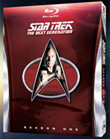 | Order Star Trek: The Next Generation Season 1 Blu-Ray today! | 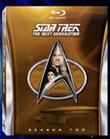 | Order Star Trek: The Next Generation Season 2 Blu-Ray today! |
|---|
